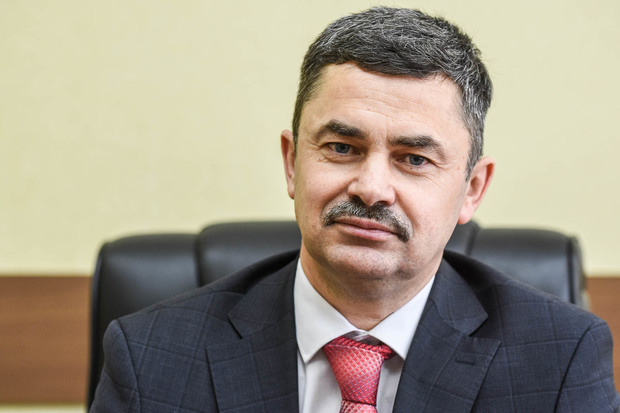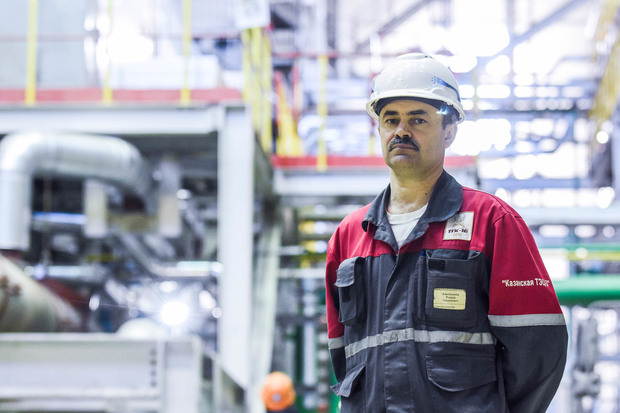''General situation in Russian energy sector has changed''
Chief engineer at Kazan CHP-3 tells about weak points of the Russian energy sector, a large-scale project in Tatarstan and the current state of the engineering. Part 1
Major energy investment project of TGC-16 JSC, which is important not only for Tatarstan but for the whole Russia, finishes this spring. The construction of the gas turbine unit at Kazan CHPP-3 will reduce the tension of the accumulated problems of electricity and heat supply of Kazan, the station will be the power centre of the whole Kazan power district and future Kazan electricity grid of 220 kV. Realnoe Vremya has learnt from principal engineer of the Kazan CHPP-3 how the implementation of the project goes. About concerns of the industry, the problem of training and about the lack of mid-level professionals — Rashid Akhmetzyanov told in an interview to our newspaper.
''A significant project of big energy of Russia''
Mr. Akhmetzyanov, as far as we know, this year is rich in significant events: a major project is expected, the station will celebrate its 50th anniversary, your jubilee...
First of all, I would like to say that Kazan CHPP-3 will celebrate the 50th anniversary next year. This year there will be preparation for the upcoming event. Second, you know, I do not like the concept of ''anniversary''. An anniversary, it is always the review of results, the end of something, the assessment of performance. We have a little different situation. Our team and I, and the company TGC-16, are in constant motion. We finish one projects and immediately plan the other. We have a young team, many goals, we are still at the very beginning.
At the present time, there is a negative attitude to the electrical energy industry: the industry is in crisis, programmes of investment and modernisation are being folded, there are many talks about a falling prestige of the power engineering profession. At the same time, we have a major investment project to install the new gas turbine. At what stage is the implementation now?
We have already reached the finish line. Everything is according to the plan. Startup and commissioning works are underway. The first tests with full load have already been conducted. By April 20, we plan to complete certification tests of the plant. All electricity that is produced during commissioning works in April is already being implemented in the wholesale electricity market. Now we understand that this energy is more than competitive compared to neighbouring power plants. Of course, the economy of the enterprise will benefit from this.

The construction project of GTP is interesting not only for us but for the whole of energy of Russia
Obviously this is a complex and ambitious project. Tell us more about it.
Kazan CHPP-3 is the second energy object in the world that has the gas turbine of this type. The basis of the plant is a gas turbine 9HA.01 with electric power at 388,6 MW. This turbine is considered to be the largest and most efficient in the world. In the course of the tests, the achieved efficiency rate of the gas turbine was around 42%, which is one of the best indicators for turbines of N class. In the cycle CCGT with its participation we expected the overall efficiency of fuel utilisation at the level of 85%. Moreover, this turbine is not only highly efficient but also environmentally friendly. Low-emission combustor chamber will significantly reduce their emissions into the atmosphere by Kazan CHPP-3.
This project is interesting not only for us but for the entire energy sector of Russia because here the contractor under the contract on a ''turn-key'' basis was actually the manufacturer of the main equipment. In this case, it is the American company General Electric. For them, it is the first such contract in Russia. Few believed that we would be able to negotiate and successfully implement the project on such terms. But GE made their choice, and, as you can see, we already have the result. I know that TAIF group of companies is currently working on a similar project at the site of Nizhnekamskneftekhim PJSC. Here, already as a contender for EPC contract, in addition to GE, there is also the company Siemens.
''Today the level of engineering has fallen sharply worldwide''
What has this project given you personally?
The project has given me a lot. First, thanks to it, I realized that we should not be afraid of changes. In the middle of 2014, we signed a contract, and already in the middle of 2015, we received a building permit and went on the site. Best experts of GE in the composition of the project team worked at that site. During those six years, even global companies such as General Electric has had huge internal changes, and we witnessed them. The world is changing very quickly. Whatever the company, it should be ready to change quickly and follow new trends. Second, I realized that our specialists, who worked on the project together with GE, and Russian power engineers in general, are highly qualified. It is confirmed by the fact that there are many Russian guys in the GE team. Throughout this project, we worked together with very experienced, ''old-timer'' project managers of the companies GE and GAMA (a Turkish company-partner of GE for the implementation of the project — editor's note). These professionals have built and launched more than a dozen projects around the world. They all say that the level of engineering, the level of training of engineers in design, installation, commissioning of complex technological systems, like electric power stations, have fallen dramatically in recent years throughout the world. Even in Western Europe, it is difficult to find professionals who could manage projects like ours. There is a particular shortage of mid-level professionals. Now there is a problem of imbalance in education when everyone rushed to IT, both in the West and in our country. But they need just need to be able to design, build, to be able to mount, to adjust equipment and to supervise these works. We need professionals who could make decisions, would be ready to stand their ground and to bear responsibility for it. Such specialists are in short supply everywhere. I must say, it is good that in our Republic, at least in the power sector, we have managed to keep engineering and companies that can perform works on installation, commissioning of electrical equipment, mechanical equipment, and design at decent quality. The work for them together with such giants as GE is also an opportunity to gain new knowledge, skills and experience of interaction with foreign companies in the framework of the requirements of the world standards.

Now Kazan CHPP-3 has actually become an additional centre of power of the Kazan power district within the framework of the emerging ring of 220 kV
How has the project effected the team of Kazan CHPP-3?
The team has developed a lot due to this project. Every large construction is a serious school for growth of knowledge and skills. We have a lot of young engineers who have obtained additional knowledge and experience on this project, began to look differently at the issues of production, issue of exploitation. Their experience will be in demand. TGC-16 and TAIF have immediately begun to attract professionals to the preparation of a similar project in Nizhnekamsk. It turns out that TAIF Group is now forming such center of competence on energy. It's great that we, as a specialized energy company group, are fully involved in this process and can be useful. We work closely with energy services of the industrial companies of TAIF Group. There is a huge exchange of experience and knowledge. In the end, even ordinary specialists on any problem look not only on the part of manufacturer and supplier of energy resources but also on the part of consumer.
In the Soviet Union, the energy system was unified and consisted of all the stations and the network. Now it is divided. Has something changed in your approaches? What is the role of the station today in the eenergy system of the republic?
As for the operation of the station, technically there have been no changes. We are a subject of the unified energy system of Russia and a part of the scheme of heat supply of the city of Kazan. The operation of the station is determined by the System operator of the unified energy system, in the thermal network – of the dispatch service of thermal networks. Besides, the approaches of TGK-16, which are implemented at TAIF Group, imply a close interaction between the producer of heat and electricity and their customers, as well as the interaction of all subjects of electric power industry. It is significant that the main share of heat, which our station releases, goes to Kazanorgsintez. The activity of this enterprise directly depends on how reliably we work. Therefore everything we do should be aimed at ensuring the reliability of our work. On the other hand, we understand that the price of our thermal energy should not undermine the competitiveness of the end user. It should not have an unbearable burden to the population of our city. Therefore, our commercial interests are limited by the capabilities of the consumer, nevertheless, we managed to find a middle ground to ensure the development of the company and not to alienate the consumer. Although, maybe it is not always easy.
In the energy system, the project of GTP at Kazan CHPP-3 is illustrative, it shows that it is impossible to implement construction of a power plant for the sake of the construction of power plants, as it happened in some regions of Russia. In the end, the stations built by the PDM program are often not loaded because some of them were built where their power is just not needed. But the consumer still pays. We planned GTP not only as a power plant, which will operate on the wholesale electricity market in the interests of TGC-16 JSC. Its design solutions primarily provide the supply reliability of the city of Kazan, the Kazan power district. We together with Grid Company JSC are engaged in fruitful work in this direction and we fully coordinate our technical decisions. Now Kazan CHPP-3 has actually become an additional centre of power of the Kazan power district within the framework of the emerging ring of 220 kV. Besides, the implementation of this project will allow TGK-16 JSC to continue to provide its customers, including the population, with thermal energy at the lowest in the Republic of Tatarstan tariffs. Therefore, our approaches laid down since the founding of the station have not changed. We are, as before, bring light and heat at every home. Another thing is that the general situation in the energy sector and especially in the heat supply have changed.
To be continued